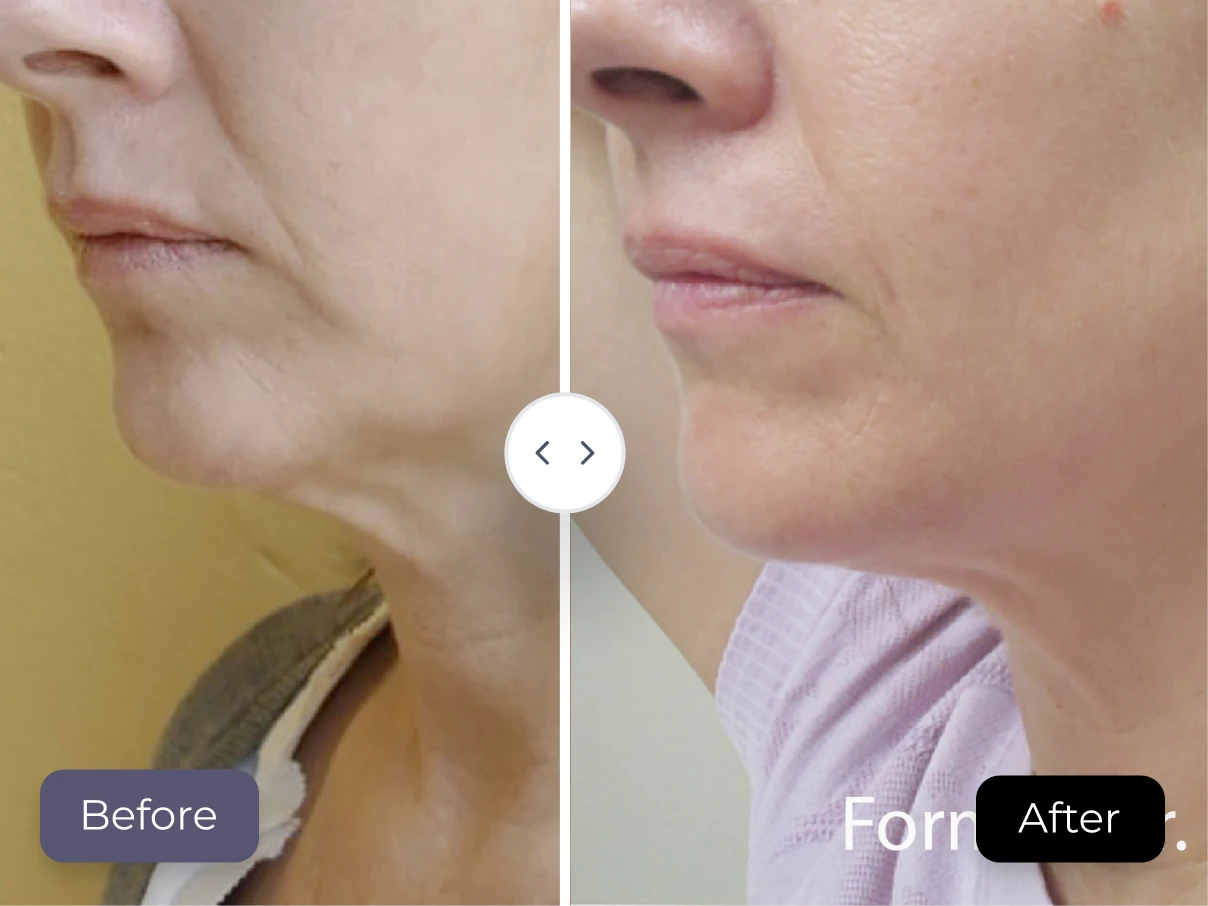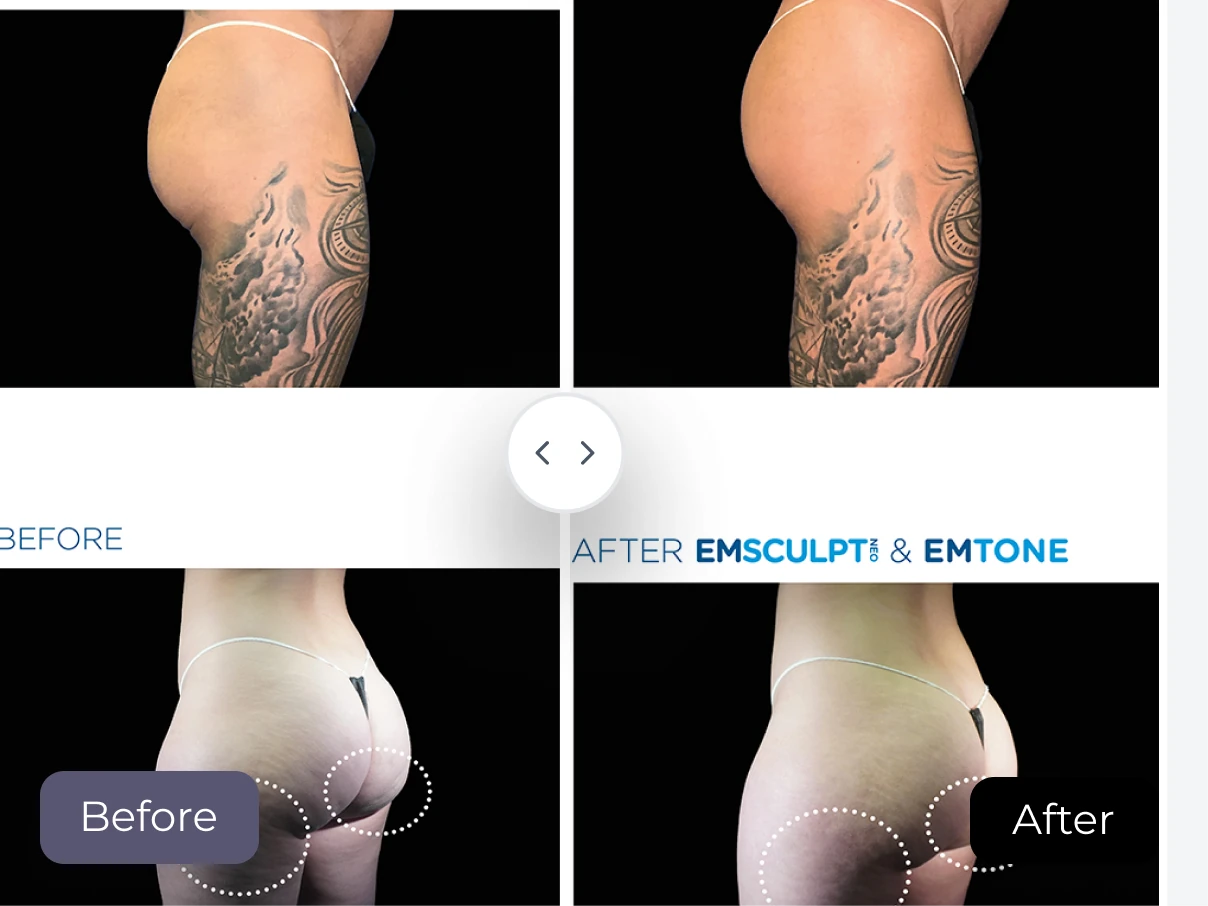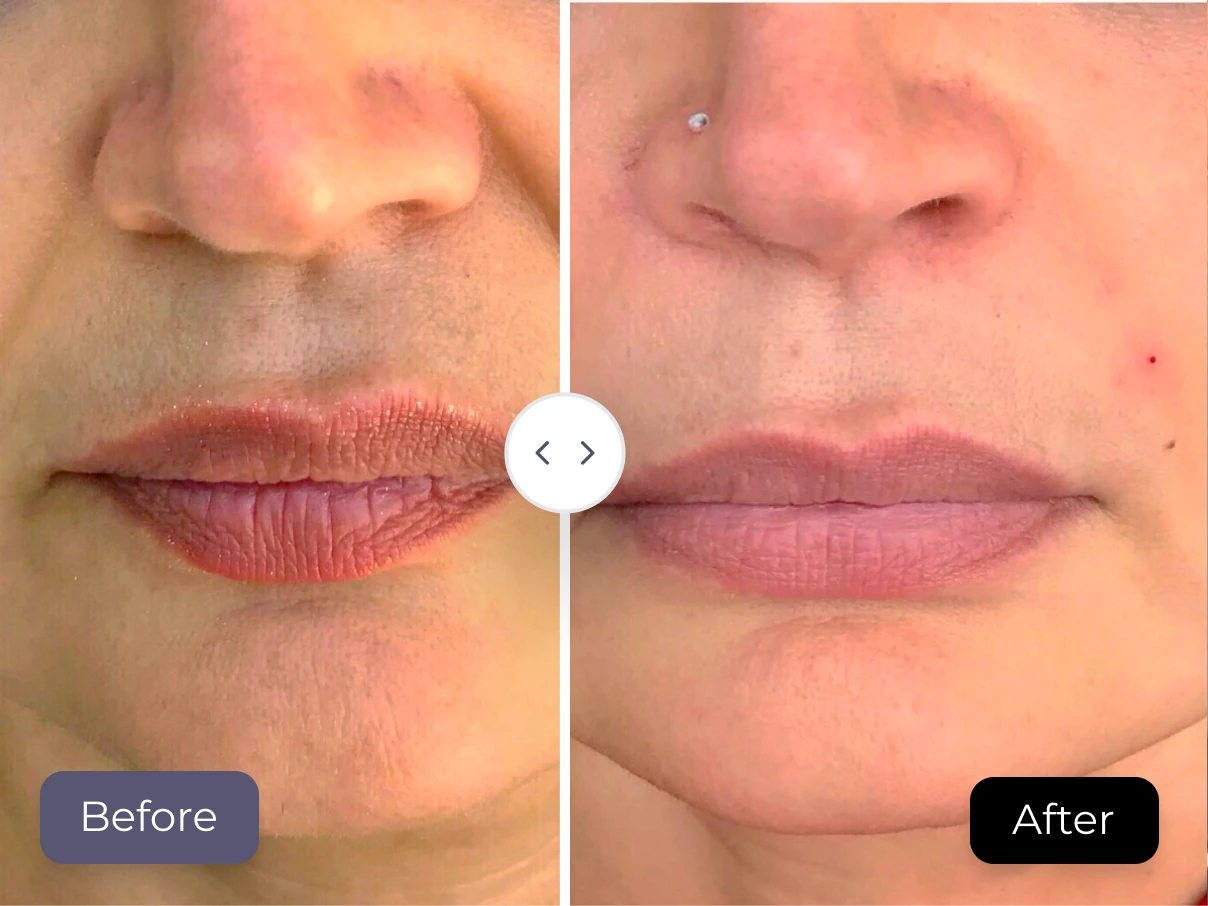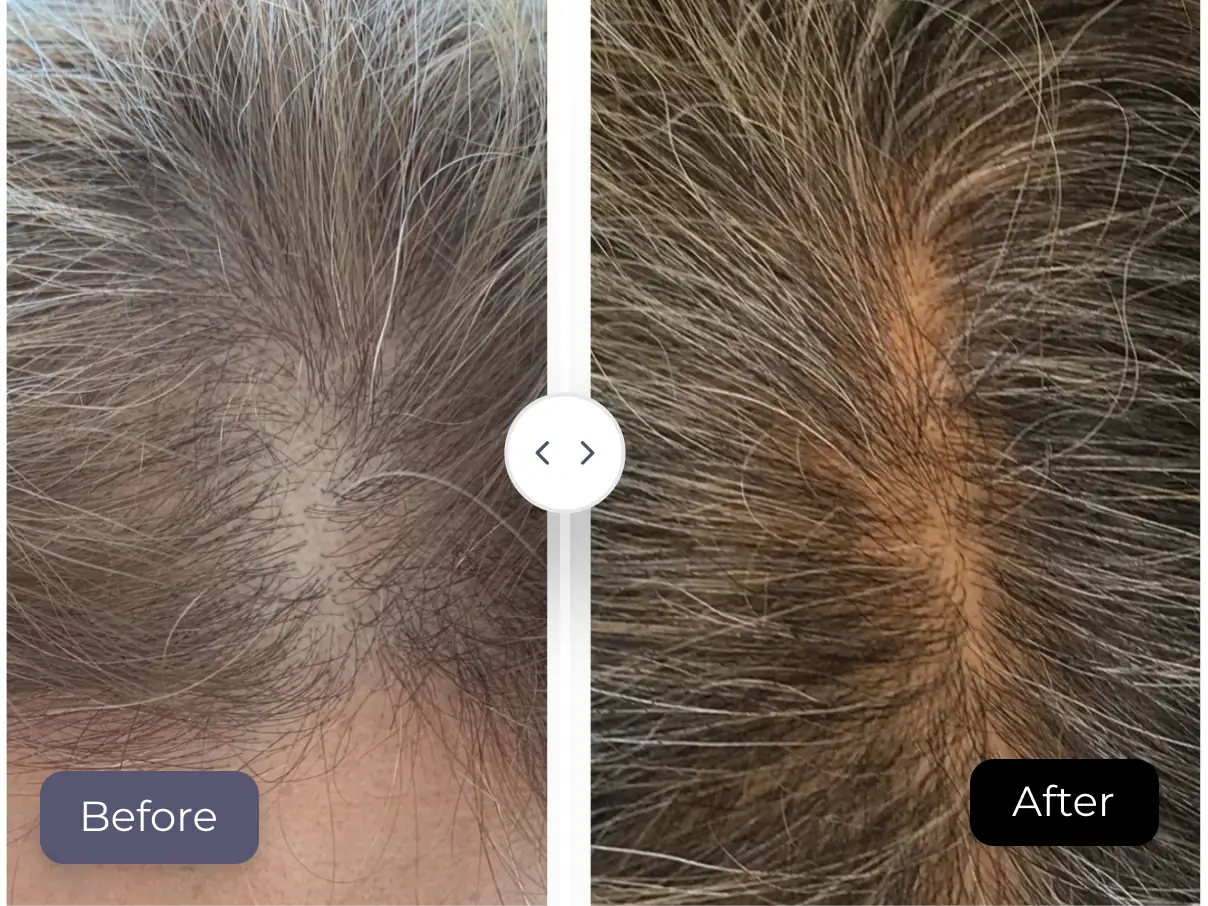Laser acupuncture is a cutting-edge, non-invasive therapy that uses low-level lasers to stimulate specific acupuncture points on the body. Unlike traditional acupuncture, which involves needle insertion, this method utilizes light energy to promote healing and restore the body’s natural energy balance.
This approach employs Low-Level Laser Therapy (LLLT), also known as photobiomodulation, to activate biological processes, alleviate pain, and accelerate tissue repair. It is widely used for pain management, stress relief, and overall wellness, providing a gentle alternative for individuals who prefer needle-free treatments.
Recognized as a valuable complementary therapy, laser acupuncture addresses various health concerns, including chronic pain and inflammation, through a safe and non-invasive process. Its modern roots trace back to traditional Chinese medicine principles, combined with technological advancements in LLLT during the late 20th century.
Researchers developed this technique by integrating ancient acupuncture practices with innovative laser technology, offering an effective, needle-free solution. Over time, laser acupuncture has gained global popularity for its ability to deliver alternative medicine benefits while accommodating those seeking less invasive treatment options.
Techniques Used in Laser Acupuncture
Laser acupuncture treatments utilize advanced techniques to stimulate acupuncture points without using needles. By employing low-level lasers, this non-invasive treatment offers a safe and effective alternative to traditional acupuncture.
In this section, we explore the types of lasers used, the procedure details, and how laser acupuncture compares to its needle-based counterpart.
Types of Lasers Employed
Various lasers are used in laser acupuncture to target acupuncture points safely and effectively. The most common are low-level lasers (LLL) or cold lasers, which emit light at a low intensity without generating heat, ensuring patient comfort and safety.
Here’s an overview of the lasers typically employed:
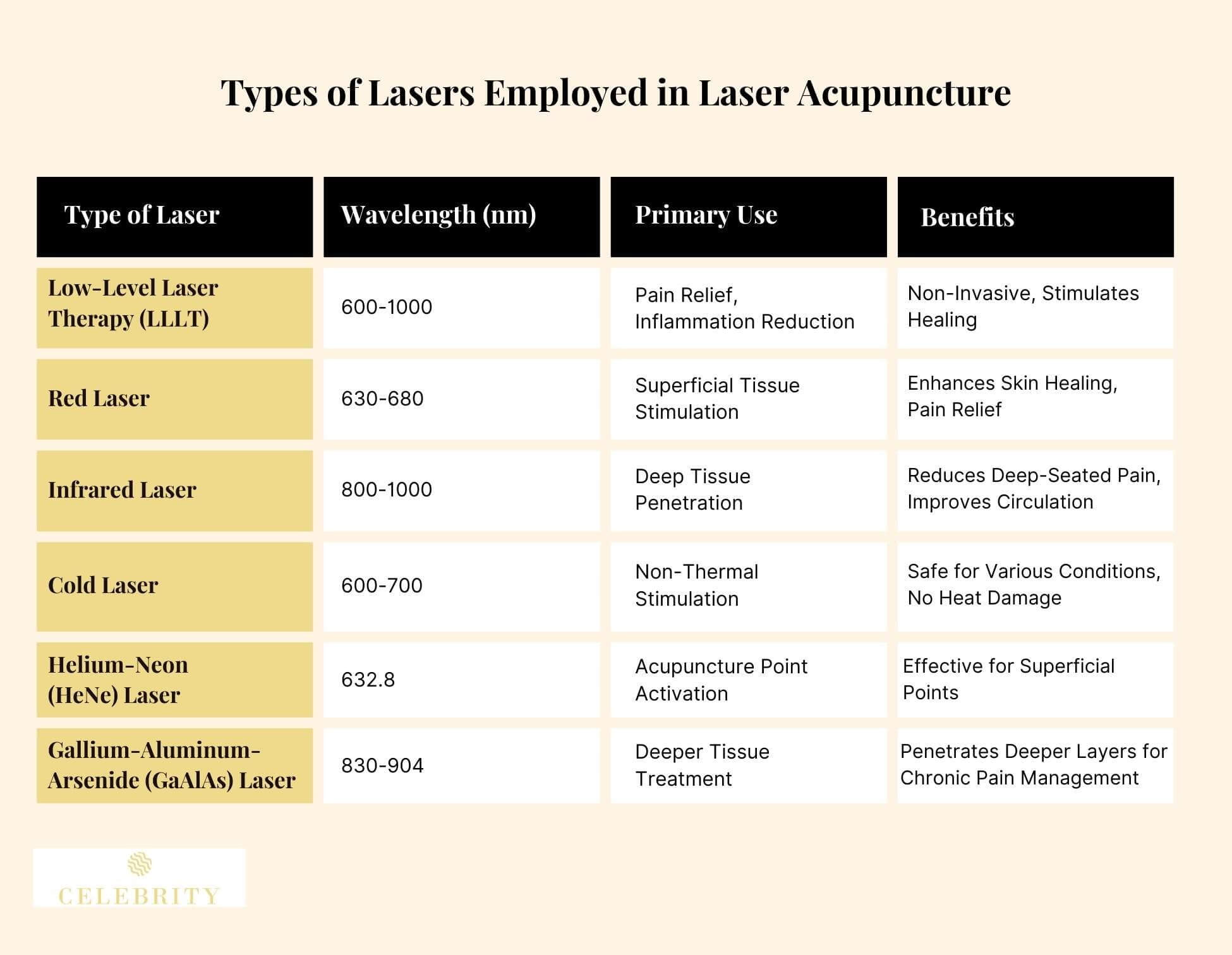
These lasers stimulate the body’s natural healing mechanisms through photobiomodulation, promoting cell regeneration, reducing inflammation, and improving circulation. Practitioners select lasers with specific wavelengths and power levels based on the condition being treated to achieve optimal results.
Procedure Details
Laser acupuncture is a painless, non-invasive procedure. Similar to traditional acupuncture, a practitioner identifies specific acupuncture points; however, instead of needles, they use a handheld laser device to deliver low-level light energy directly to these points.
Key features of the procedure include:
- Precision Application: The laser is applied gently to the skin for 30 seconds to several minutes per point.
- Versatility: This technique treats various conditions, including chronic pain, arthritis, migraines, and stress.
- Comfort: Patients may feel mild warmth or tingling at the site, but there is no discomfort or risk of injury.
Multiple sessions may be recommended based on the condition’s severity and the patient’s response to treatment.
Comparison with Traditional Acupuncture
Laser acupuncture provides several advantages over traditional needle-based acupuncture. Below is a detailed comparison:
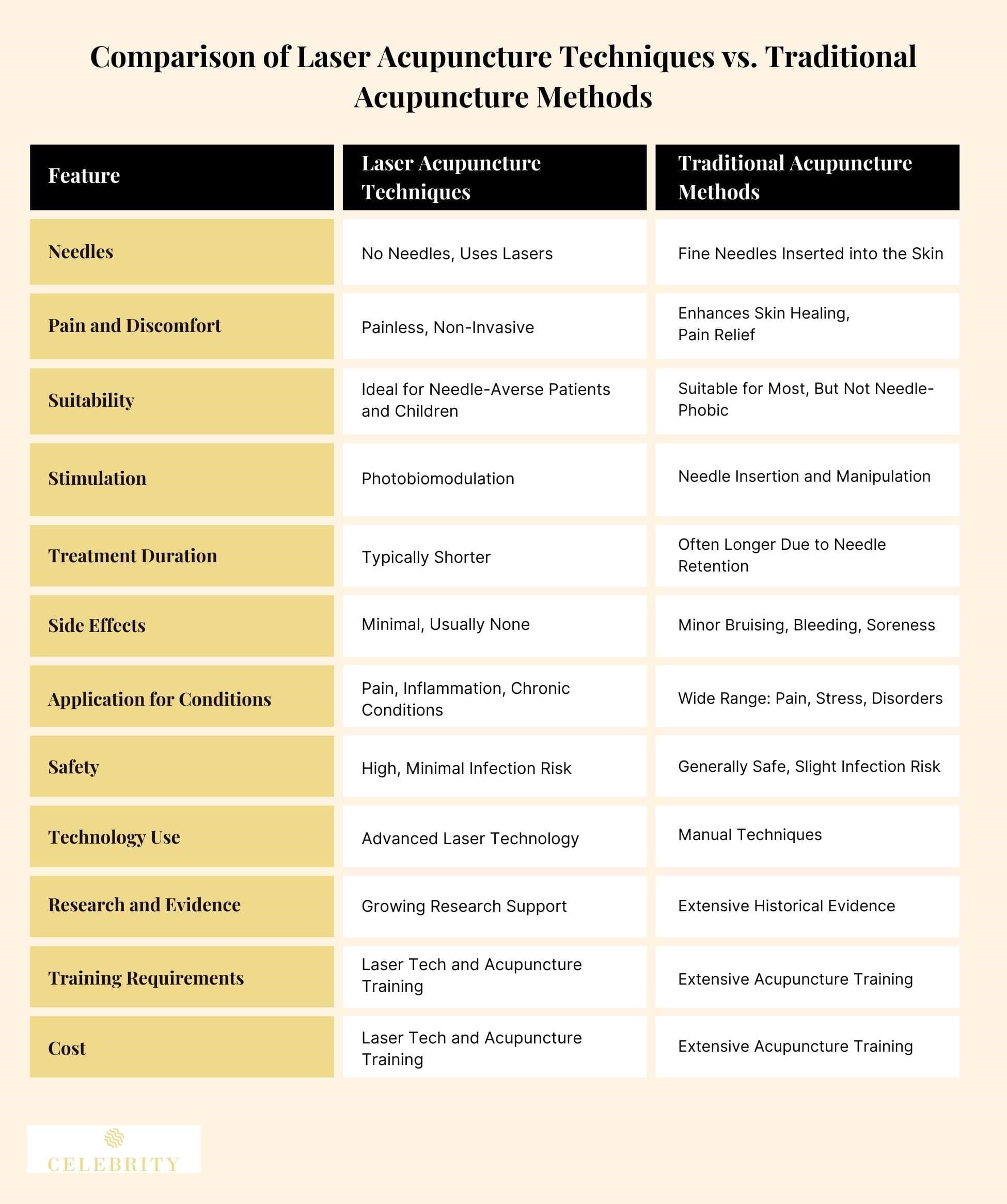
One of the primary differences is that laser acupuncture is an entirely non-invasive treatment, making it ideal for patients who are averse to needles or have a fear of them.
While traditional acupuncture involves the insertion of fine needles into specific acupuncture points to balance energy flow, laser acupuncture uses low-level lasers to stimulate these points without penetration. This makes laser acupuncture a painless and comfortable alternative that is equally effective for treating conditions like pain relief, stress reduction, and improving overall wellness.
Additionally, laser acupuncture is suitable for a broader range of patients, including children, elderly individuals, and those with sensitive skin or chronic conditions where general acupuncture treatments might be challenging. The technique also allows for more targeted stimulation, as lasers can focus precisely on acupuncture points, reducing the risk of discomfort.
However, some patients may prefer the traditional approach, which directly stimulates the body’s energy pathways. Both methods aim to restore balance and address a wide range of health issues, but laser acupuncture stands out for its non-invasive nature and growing popularity in alternative medicine.
Key Benefits of Laser Acupuncture
Laser acupuncture provides a versatile and non-invasive solution for various health concerns, gaining popularity for its ability to address conditions effectively with minimal discomfort. Below, we explore its key benefits:
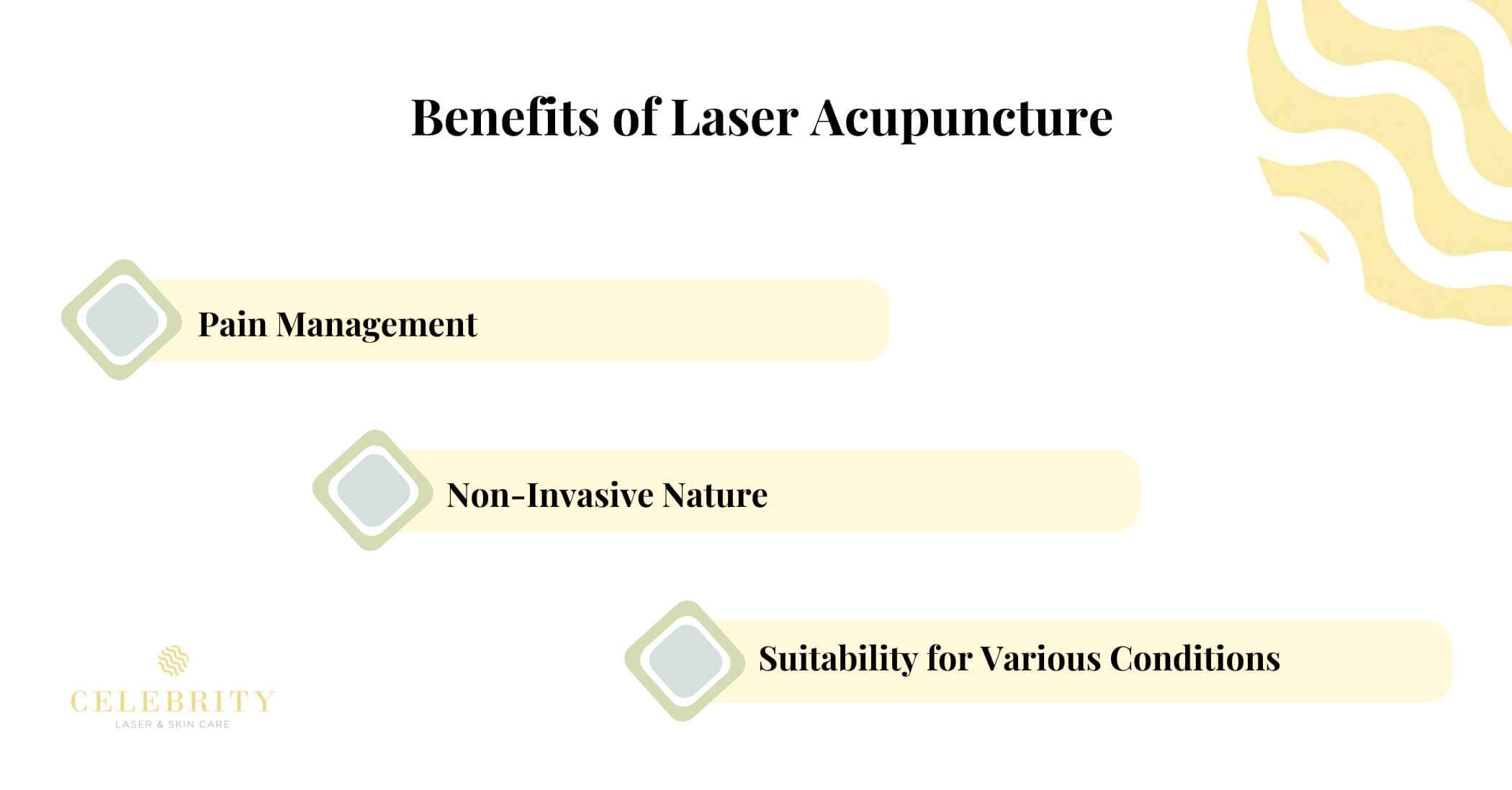
Pain Management
Laser acupuncture is highly effective for managing pain, including chronic conditions like arthritis, muscle strains, and migraines. Low-Level Laser Therapy (LLLT) promotes natural healing by improving circulation, reducing inflammation, and stimulating endorphin production.
This needle-free treatment offers relief from back pain, joint discomfort, and other ailments, helping patients reduce dependence on medications.
The technique also encourages tissue regeneration, making it a practical alternative for those seeking drug-free solutions to chronic pain.
Non-Invasive Nature
A standout benefit of laser acupuncture is its painless and non-invasive approach. Instead of needles, focused light stimulates acupuncture points, offering:
- A comfortable experience without bruising or soreness.
- An ideal solution for needle-averse individuals or those preferring a gentler option.
Suitability for Various Conditions
Beyond pain management, laser acupuncture supports overall health and wellness:
- Stress and Mood: Effectively reduces stress, enhances relaxation, and improves mood.
- Inflammation and Circulation: Alleviates inflammation and boosts blood flow.
- Specific Conditions: Addresses fibromyalgia, TMJ disorders, digestive issues, and skin rejuvenation.
- Holistic Benefits: Suitable for diverse health needs, it offers a versatile alternative for promoting healing and balance.
For personalized guidance on laser acupuncture’s benefits, connect with Celebrity Laser Care and explore tailored treatment options.
Laser Acupuncture: Applications and Effectiveness
Laser acupuncture presents a promising, non-invasive solution for various health concerns by utilizing focused light energy. This therapy is increasingly popular for its role in pain management, healing promotion, and addressing a wide array of conditions.
Is laser acupuncture as effective as traditional acupuncture?
Laser acupuncture, using Low-Level Laser Therapy (LLLT) or photobiomodulation, has gained recognition for its non-invasive nature and effectiveness in treating several conditions. Unlike traditional acupuncture, which uses needles, laser acupuncture stimulates acupuncture points with light energy, helping balance the body’s energy and promote healing.
Research suggests that laser acupuncture can yield results comparable to traditional methods, particularly for pain management and reducing inflammation, making it an excellent choice for needle-averse patients.
What conditions can be treated with laser acupuncture?
Laser acupuncture effectively manages diverse conditions, especially those related to pain. It has demonstrated success in treating:
- Chronic Pain: Conditions like osteoarthritis, back pain, and fibromyalgia.
- Migraines: Reducing frequency and severity.
- Sports Injuries: Enhancing recovery and alleviating musculoskeletal discomfort.
- Skin Rejuvenation: Promoting collagen production and improving skin health.
Are there any side effects of laser acupuncture?
Laser acupuncture is a safe and non-invasive therapy with minimal risks. Possible side effects include:
- Skin Irritation: Mild redness or swelling at the treatment site, which usually resolves quickly.
- Mild Discomfort: A slight tingling sensation during the session, typically short-lived.
- Temporary Symptom Worsening: Symptoms may briefly intensify before improvement, as part of the healing process.
- Eye Safety Concerns: Protective eyewear is essential to avoid potential harm from laser exposure.
Conclusion
Laser acupuncture is a modern, non-invasive technique that uses low-level laser therapy (LLLT) to stimulate acupuncture points. This needle-free alternative to traditional acupuncture effectively manages pain, reduces inflammation, and addresses various conditions such as chronic pain, headaches, and musculoskeletal issues.
With minimal side effects, laser acupuncture is ideal for needle-averse patients and those exploring alternative medicine treatments. Consulting a qualified practitioner is essential to determine if laser acupuncture suits your specific health needs. Discussing your medical history and current treatments with a professional ensures safe and effective results.
Patients should also evaluate the qualifications and experience of the practitioner to fully benefit from laser acupuncture techniques. Scheduling a consultation with experts at Celebrity Laser Care provides personalized advice and tailored treatment plans.
Additionally, Celebrity Laser Care offers advanced cosmetic acupuncture treatments designed to enhance facial rejuvenation and promote natural beauty.


